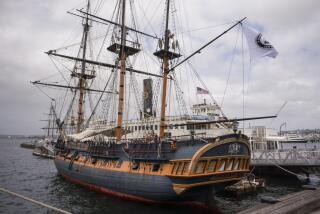Big Ships, Tight Water, High Pay
- Share via
He cannot stop with merely thinking a thing is so and so; he must KNOW it; for this is eminently one of the “exact” sciences. With what scorn a pilot was looked upon . . . if he ever ventured to deal in that feeble phrase “I think” instead of the vigorous one “I know!”
--Mark Twain, “Life on the Mississippi”
*
A ship safely docked is the maritime equivalent of the airplane that did not crash, the canyon that did not catch fire. No one notices. It is not news. And so here is a story from the Los Angeles harbor that never got told.
One day not too long ago one of the city’s dozen harbor pilots was bringing in a big freighter. The vessel was unevenly loaded, erratic in its behavior.
Nearing port it “took a run,” as the pilots say, and veered toward shore. There was no time to confer, to weigh options: The pilot had to know, now. In the Navy he had steered everything from barges to aircraft carriers. Before he became a Los Angeles pilot he’d spent two years committing to memory every feature of the waterway, every sandbar and buoy light. He knew.
Drop both anchors, he called out. Reverse engines at full, emergency power. Pivot the vessel. Of course, 250,000-ton ships do not handle like roadsters. For the next five minutes, the pilot only could watch and “wait to see if what I did was going to work.” At last the ship stopped in the water--one yard short of ramming the shore.
“Things like that don’t happen very often,” the pilot would say last week, “but they can happen at anytime.”
*
This anecdote was not exactly volunteered. It was more or less extracted. Harbor pilots, it seems, prefer to perform in obscurity, their exotic skills known only to ship captains and dockhands. Last week, however, the municipal pilots who serve Los Angeles harbor went on strike. This put them in the rather awkward position of attempting to persuade a baffled city that they ought to be paid almost $200,000 a year--a vigorous 72% pay raise.
“Absurd,” sputtered the mayor. “Outrageous,” thundered a City Council member. The general public, too, seemed rattled: more than once the pilots were described as “glorified bus drivers.” One sensed in the fallout a subtext of envy--aimed not so much at the pilots’ pay, but at their daring, their audacity, to strike for more.
In this downsized age it is perfectly acceptable for television sidekicks to demand a million an episode, or for O.J. walk-ons to hustle six-figure book contracts, but working stiffs are expected to remain docile, content to have any job at all. Nobody strikes for money anymore; holding out for a better buyout package is considered the height of bravery in most shops. And yet there were the pilots, outside a locked gate at the water’s edge, gamely making their case.
They spoke of the $300-million ships and cargoes they guide through the port, and the potential cost a single slip: Yes, the Exxon Valdez was mentioned. They compared pay stubs with other pilots: the national average is $195,000 a year; in Florida, pilots earn close to $250,000. They noted that every economic analysis of L.A. begins with a description of its thriving port--”and we,” said one striker, “are its insurance policy.”
*
Their best point, however, was one they seemed shy about raising: Few people--and no computer--can do what they do, moving colossal vessels through tight waters, trusting an almost perfect knowledge of a harbor and the ways of ships. Pilots are to shipping what Griffey is to baseball, what Gates is to software. “Kings without a keeper,” Twain called them in his Mississippi memoir.
Twain told of one steamboat pilot who, broke, accepted a job at half the going rate, then a staggering $250 a trip. Once en route, the pilot’s legendary memory of the river seemed to evaporate. He slowed to a novice’s crawl, keeping cautiously to the river’s center. At last the exasperated boat owner felt obliged to suggest a shortcut. The pilot said he wasn’t sure.
Well, demanded the owner, “isn’t there water enough in it now to go through?”
“I expect there is, but I am not certain.”
“Upon my word this is odd! Why, those pilots on the boat yonder are going to try it. Do you mean to say that you don’t know as much as they do?”
“They! Why they are $250 pilots! But don’t you be uneasy; I know as much as any man can afford to know at $125!”
The employer, Twain reported, soon “surrendered” to this one-pilot job action, having relearned an old lesson, applicable even today, about getting what you pay for.
More to Read
Sign up for The Wild
We’ll help you find the best places to hike, bike and run, as well as the perfect silent spots for meditation and yoga.
You may occasionally receive promotional content from the Los Angeles Times.







